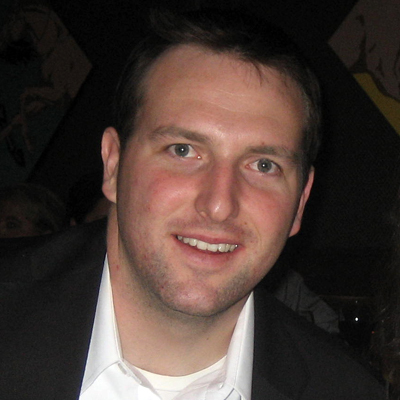Developing novel enzyme catalysts to enable real-world solutions for issues in food, health, and chemical production
"Better Living Through Chemistry" is a classic tagline used to emphasize the role of chemistry in advancing technology. One way to achieve this reality is through computational enzyme engineering, looking at and taking tools from nature and utilizing them to solve problems in the modern world. Enzymes are the primary means by which biology performs chemical transformations, and naturally evolved enzymes have been optimized over long periods of time to address challenges biological systems face in nature. However, modern society faces additional challenges in food, energy, and health, and to address these challenges, novel catalysts are needed. Dr. Justin Siegel, Assistant Professor at the University of California, Davis, and his lab therefore focus on the use of computational, genetic, and chemical methods to design, build, and test enzyme catalysts tailored for applications widely beneficial for the society today.
Current research projects include:
- Next Generation Therapeutics: Proteins are the fastest growing sector of therapeutics. Dr. Siegel and his lab plan to generate the next generation protein therapies by developing enzyme catalysts with bioorthogonal functions. This will enable highly specific molecular reactions to be catalyzed in the human body with minimal side effects. They will focus on developing novel protein therapeutics that could potentially enable novel treatments for cancer, autoimmune disorders, diabetes, and obesity. For example, the Siegel lab has recently engineered an enzyme that has the potential to treat Celiac Disease and Gluten Intolerance. Significant breakthroughs could enable related solutions for a myriad of diet related disorders (e.g. peanut allergy or milk intolerance).
- Sustainable Agriculture and Food Processing: Dr. Siegel is very interested in pursuing projects that help improve crop robustness to enable feeding large populations highly nutritious food and is working to develop methods that improve processing of food products to maximize their health benefits. Significant breakthroughs in the Siegel lab will enable them to develop solutions to facilitate food production that mitigates mycotoxin poisoning which is effecting >25% of the worlds population, and >50% of the population in developing countries such as Africa.
- Renewable Fuels and Chemicals: A large fraction of today’s oil goes towards long range transportation and chemicals used for making materials. These products are unlikely to be replaced by batteries. While oil naturally forms in millions of years, it would be ideal to design catalysts to rapidly produce specific components of oil. However, for most of the desired chemical compounds there is no natural transformation route from readily available renewable feedstocks into high-value petrochemicals (except for time, heat, and pressure, from which product mixes are made). One possible route to address these challenges is the application of biotechnology to engineer systems for the production of fuels, materials, and the conversion of carbon dioxide into value-added products. Current efforts have primarily focused on combining several existing biological parts, but there are many products and routes that will be inaccessible if limited solely to naturally occurring parts. Therefore, the development of biological systems to produce products not found in nature will require the design of parts with novel functions. With support, the Siegel lab will enable the development of DIRECT production of petrochemical based diesel fuels using renewable resources (i.e. plant derived sugars).
- Novel Computational Design Methods: Recent advances in genomic sequence have resulted in the identification of well over 20 million (and growing) protein sequences. Dr. Siegel and his lab are interested in developing novel computational methods that utilize this information in the design process of novel enzymes. Incorporating this abundance of readily available information into the design process should enhance the success rate of engineered enzymes and ultimately allow us to achieve the production of highly efficient enzyme catalysts. This line of research directly addresses what has been identified by the National Academies as one of the major challenges for the industrialization of biology.
Bio
Growing up with a father who received a Ph.D. in physical organic chemistry and helped start a genetic engineering company that develops enzymes used in detergents, Dr. Justin Siegel spent his childhood making soaps and freezing things in the garage with his dad. Dr. Siegel, from a very young age, would seek ways to build better computers with improved graphics. Following the footsteps of his father, as a high school student, Dr. Siegel held summer internships at Applied Biosystems where his father worked at, and often followed his dad to the office to discuss ideas with computer engineers and scientists. Eventually, he decided to move forward with biochemistry, and he now hopes to inspire and train the next generation of scientists who will further advance technology.
Outside of his research, Dr. Siegel has a deep love for chocolate and collects chocolates; in fact, he keeps a bookshelf dedicated to this collection of chocolates, from everywhere and anywhere. Whenever he brings back chocolates or receives them from places he travels, his family will taste it and discuss which is their favorite. “The best milk chocolate,” he says, “is the Christopher Elbow,” and that “chocolates and kids (two daughters) are pretty much what [he] [does].”
For more information, visit https://sites.google.com/site/ucdsiegellab/home
In the News
Publications
Awards
International Genetically Engineered Machine Competition: Grand Prize, 2014
Alfred P. Sloan Research Fellow in Computational & Molecular Biology, 2014
International Genetically Engineered Machine Competition: Grand Prize, 2011
Fred Hutchinson Cancer Research Center Harold M. Weintraub Graduate Student Award, 2011
International Genetically Engineered Machine Competition: Best Health and Medicine, 2010
Patents
U.S. Patent Appl. No. 62/009,857: "Biological Conversion of Ethylene to N-Butanol and Other Chemicals."
Atsumi S., Toney M.D., Rogriguez G.M., Tashiro Y., North N.J., Siegel J.B., Carlin A.D.
U.S. Patent Appl. No. 61/865,787: "Celiac Sprue Protein Therapeutic. Compositions and Methods for Treating Celiac Sprue Disease."
Siegel J.B., Pultz I.S., Baker D.
U.S. Patent Appl. No. 61/521,899: "Celiac Sprue Protein Therapeutic."
Siegel J.B., Pultz I.S., Baker D., Gordon S. Stanley S., Hadidi H., Toland A., Wolf S., Wu S.
U.S. Patent Appl. No. 61/383,249: Systems And Methods For Biotransformation Of Carbon Dioxide Into Higher Carbon Compounds."
Siegel J.B., Baker D, Lidstrom M, Lee A, Louw C.
U.S. Patent Pub. No. 2009/0155873 A1: "Biofuel Production."
Kashiyama Y, Yoshikuni Y, Baker D, Siegel J.B.


